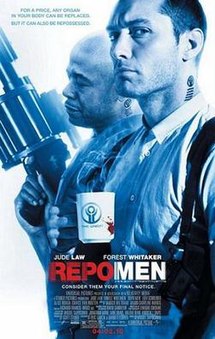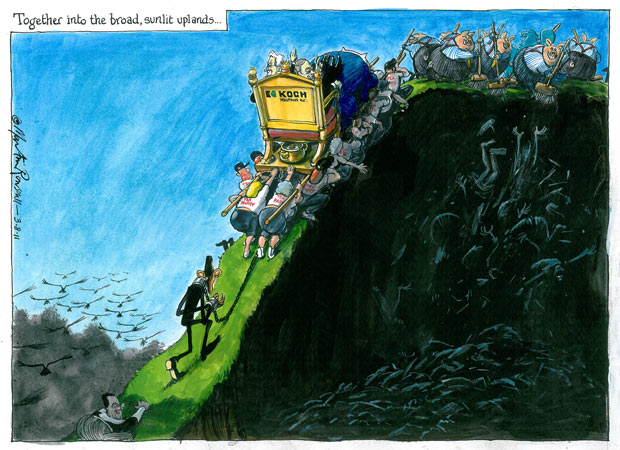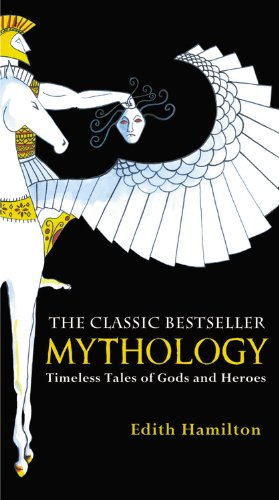Recently I got to watch Repo Men and was really surprised. I had seen the trailer when the film was released but it didn't interest me enough to get me to see it. Or maybe I just didn't have the opportunity, you see, I can't really remember. Anyway, the film is really good, brings up a lot of food for thought about the society and has surprises well kept until the very end.
The film is placed in a futuristic Earth where a company named Union has created a way to produce artificial organs and sells them to the sick people at high costs which people are forced to pay by their credit line at overwhelming interest rates. The viewer is shown mostly the point of view of one of the repo men (Remy), the ones that recover, by any means necessary, the organs of the people that fail to pay, here played really well by Jude Law and being knocked out four times. In the beginning he and his friend and co-worker Jake (Forest Whitaker) may feel quite scary, being totally unaffected by the nature of their job and the unfairness of the system they are a part of. Gladly, the film isn't at all limited to showing a bit of bloodshed and despair, and Remy is eventually forced into rethinking all this, both by his wife and after a life-changing event in the course of one of his jobs. Saying anything more about the plot would be spoiling the experience of surprise and suspense weaved into Repo Men. If you are already interested, go watch it before reading anything else.
The best thing I got from this film was the way you can analyse the situation removing the specifics. This story could be about an organ selling company that kills people to take back the item from the ones that can't pay their absurd rates as much as it could be about banks getting people's houses and cars, leaving them not dead but most certainly dying in more ways than one. I was even thinking about the recent crisis in Ireland, Greece and Portugal and looking at the way the people in these countries are being forced to lose quality of life, lose jobs, lose the food on their tables because the "state" owes a lot of money after it was somehow forced into accepting some enormous interest rates. I'm not even going to discuss if the people should be paying this debt, I don't think so and even less in these conditions but that's another matter entirely. Even if one believes that the austerity policies are the best ones to solve this problem, can we really accept that people should lose their homes, their healthcare and even starve to death because the state owes money to some banks and even more so if we understand the manoeuvres by which that debt was increased?
Another very interesting theme that comes to mind after watching Repo Men follows the often repeated sentence in the film itself: "a job is just a job". But is it? Can one really agree that when he is doing his job he does not need to worry about its nature, its consequences, its impact on other people's lives, on other living beings, on Earth itself? I certainly don't. A job is not just a job, it is what it is, and as Remy learns (or does he?) by the end of the story, your job is a part of who you are. As characters in many other films and books often state, its not who you are but what you do that defines you. And this repo work wasn't wrong only because they accepted to kill people to get unpaid organs, it was even worse because they knew the way those unpayable credits were forced to the costumers who had no other choice than to submit or die without the transplant. All along the film Remy seems to only doubt continuing with his work when it affects his own life and only towards the end does he actually show an understanding of the unfairness of the system itself. But to be honest, if as an outsider, it's easy to say he is a bloodthirsty beast for doing what he does, would it be as simple to say the same about our own everyday job? Do we look at our jobs in terms of impact, justice, consequence and consider leaving them? Or do we rest every night confident that we did what we had to do in order to survive and that thought brings peace to our minds and avoids weighting on our consciousness. An amazing example of how radical events can open one's eyes to the nature of their jobs and their responsibility for following orders is Vincent Hughes, an Irish man who abandoned his job in a bank for feeling ashamed to be a part of the financial system that was behind the crisis that affects his people.
My only grudge with Repo Men was that, again, a romantic interest had to come and play an important part of everything happening. It's not that it didn't fit into the story or that I didn't like Alice Braga, I did, but after so many films one starts to feel that the industry wants you to believe that romantic passion is the one and only drive for change in this world, concept with which I thoroughly and deeply disagree.
This is, for me, what makes a very good film, its ability to make me reflect about old and new themes, to bring new ideas to mind, to make me rethink my opinions or even my whole life.
_____________________________________________________________________________
Vi recentemente o Repo Men e fui genuinamente surpreendido. Tinha visto o trailer na altura em que o filme saiu mas não fiquei suficientemente interessado. Ou talvez simplesmente não tenha tido oportunidade para o ir ver. De qualquer forma, o filme é muito bom, surpreendeu-me até ao final e deixou-me a pensar.
A história leva-nos a uma Terra futurista, na qual uma companhia chamada Union descobriu uma forma de produzir órgãos artificialmente e vende-os às pessoas doentes a preços elevados de forma que eles acabam por ter que pagar submetendo-se a um crédito com juros exagerados. O filme segue quase sempre Remy - com uma interpretação impecável por Jude Law - um dos homens que trabalha para a Union, recuperando os órgãos de clientes que não conseguem pagar as prestações, mesmo que para ísso tenham que morrer. No início do filme ele e o seu amigo e colega Jake (Forest Whitaker) são de certa forma assustadores, tal é a sua despreocupação perante o tipo de trabalho que realizam e a injustiça da qual fazem parte. Felizmente, o filme não se limita a mostrar desespero e sangue derramado, e depressa leva Remy ao ponto em que é pressionado a reavaliar a sua vida, tanto por parte da esposa como por um acontecimento que muda a sua perspectiva. Dizer algo mais do argumento de Repo Men seria estragar a experiência de suspense e surpresa que consegue proporcionar. Se por esta altura já despertei interesse, então o melhor é ver o filme antes de ler o resto.
Uma das melhores coisas deste filme é o quanto pode ser descontextualizado e aplicar o raciocínio que dele provém a várias outras situações. Esta história é credível tanto sendo baseada na Union como no contexto das instituições bancárias que acabam por penhorar a casa e o carro aos clientes que não conseguem pagar os empréstimos, por vezes deixando-os não mortos como no caso da Union mas com poucas possibilidades de sobreviver. Lembrei-me igualmente das recentes crises na Irlanda, Grécia e Portugal, onde as pessoas estão a perder qualidade de vida, o emprego e até o sustento porque o "estado" deve quantidades inacreditáveis de dinheiro depois de ter sido de certa forma forçado a aceitar taxas de juro absurdas. Não quero estar agora a discutir porque nem sequer acho que as pessoas devam estar a pagar estas crises e muito menos nestas condições, porque não é esse o intuito deste texto. Mas ainda que alguém possa acreditar que as políticas de austeridade são a melhor forma de resolver estes problemas, pode ele mesmo aceitar que as pessoas percam casa, cuidados de saúde e até a comida da mesa porque o estado deve dinheiro a alguns bancos (e mais se perceber as manobras que levaram à criação das ditas dívidas)?
Outro tema vem à cabeça no seguimento da frase tantas vezes repetida no filme: "um trabalho é só um trabalho". Será? Poderá alguém concordar que quando está a trabalhar não precisa de se preocupar com a natureza, as consequências, o impacto desse mesmo trabalho nas vidas das outras pessoas, noutros seres vivos ou até no próprio planeta Terra? Eu decerto não. Um trabalho não é, simplesmente, um trabalho, é o que é e, como Remy percebe (ou parece perceber) no final da história, é também uma parte de quem cada um é. Como muitas personagens de vários filmes e livros já disseram, não é quem nós somos mas aquilo que fazemos que nos define. Este emprego não é só condenável por consistir em matar pessoas para recuperar órgãos que não pagaram, é-o ainda mais por eles saberem a forma como os créditos de pagamento quase certamente impraticável eram impingídos a clientes cuja outra hipótese era morrer sem o transplante. Ao longo do filme Remy parece apenas reconsiderar este trabalho quando ele o afecta directamente e só no final parece mostrar alguma compreensão da injustiça do sistema do qual fez parte. Mas sejamos honestos, se de fora é fácil vê-lo como um monstro sanguinário, seria assim tão simples analisar da mesma forma o nosso próprio emprego? Será que levamos mesmo em conta o seu impacto, a justiça, as consequências e a considera-las, seriamos capazes de o deixar de imediato? Ou será que descansamos todas as noites convictos de que só fazemos o que temos que fazer para sobreviver e chega este pensamento básico para descansar a nossa consciência? Um exemplo fantástico de como acontecimentos extremos nos podem abrir os olhos é Vincent Hughes, um Irlandês que se demitiu do seu emprego num banco por se sentir culpado por pertencer ao sistema financeiro que provocou a crise que tanto prejudica o seu povo. Tomei conhecimento disto numa notícia recente no Diário Económico, para a qual deixo aqui a ligação. Aquilo de que menos gostei em Repo Men foi aquela típica e francamente cansativa necessidade de incluír um interesse romântico como força motriz. Não que não fizesse sentido no momento da história ou que eu não gostasse da interpretação de Alice Braga, muito pelo contrário, mas depois de já ter visto o mesmo conceito usado ad nauseum dá a sensação de que a industria cinematográfica mainstream quer fazer-nos acreditar que a paixão romântica é a única motivação para a mudança neste mundo, ideia com a qual eu discordo profundamente.
De resto, isto é para mim o que faz de umas horas de filmagem um bom filme, a sua capacidade de me pôr a reflectir sobre coisas novas ou antigas, oferecer novas ideias e me obrigar a reconsiderar as minhas opiniões ou a minha vida em geral.





